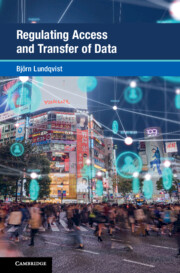Book contents
- Regulating Access and Transfer of Data
- Global Competition Law and Economics Policy
- Regulating Access and Transfer of Data
- Copyright page
- Dedication
- Contents
- 1 Introduction
- 2 The Data-Driven Economy
- 3 Competition Law
- 4 General and Sector-Specific Regulations
- 5 The Objectives of Regulating the Data-Driven Economy
- 6 The Intellectual Property Law System and Data
- 7 An Access and Transfer Right to Data
- 8 Conclusion
- Index
6 - The Intellectual Property Law System and Data
Published online by Cambridge University Press: 06 April 2023
- Regulating Access and Transfer of Data
- Global Competition Law and Economics Policy
- Regulating Access and Transfer of Data
- Copyright page
- Dedication
- Contents
- 1 Introduction
- 2 The Data-Driven Economy
- 3 Competition Law
- 4 General and Sector-Specific Regulations
- 5 The Objectives of Regulating the Data-Driven Economy
- 6 The Intellectual Property Law System and Data
- 7 An Access and Transfer Right to Data
- 8 Conclusion
- Index
Summary
Generally, the political consensus at the beginning of the internet era was that platforms should have only limited liability under intellectual property law for content that users uploaded on these platforms.1 Now, however, the platforms are the center of gravity for the Internet, drawing in (for technical reasons and owing to network effects) all data streams in the respective ecosystems, for the benefit of the system leader controlling the platform. Furthermore, the contracts that system leaders conclude with business users, and which control their business relationship, not only normally grant the exclusive right to data generated on the platform to the platform provider but also generally neutralize any intellectual property rights held by the business user. Indeed, the system leaders are regulators of their respective ecosystems and use their system of contracts to control the ecosystems and exclude the use and importance of intellectual property rights. The platform or cloud provider contractually secures the right from the platform or cloud user, not only to store the data but also to analyze it and make use of it for the provider’s own benefit, and for the benefit of others in the ecosystem, on all connected markets. The platform providers thus become the masters of their respective data ecosystems; they do indeed hoard the data and generally do not trade or share the data.
Keywords
- Type
- Chapter
- Information
- Regulating Access and Transfer of Data , pp. 167 - 205Publisher: Cambridge University PressPrint publication year: 2023

